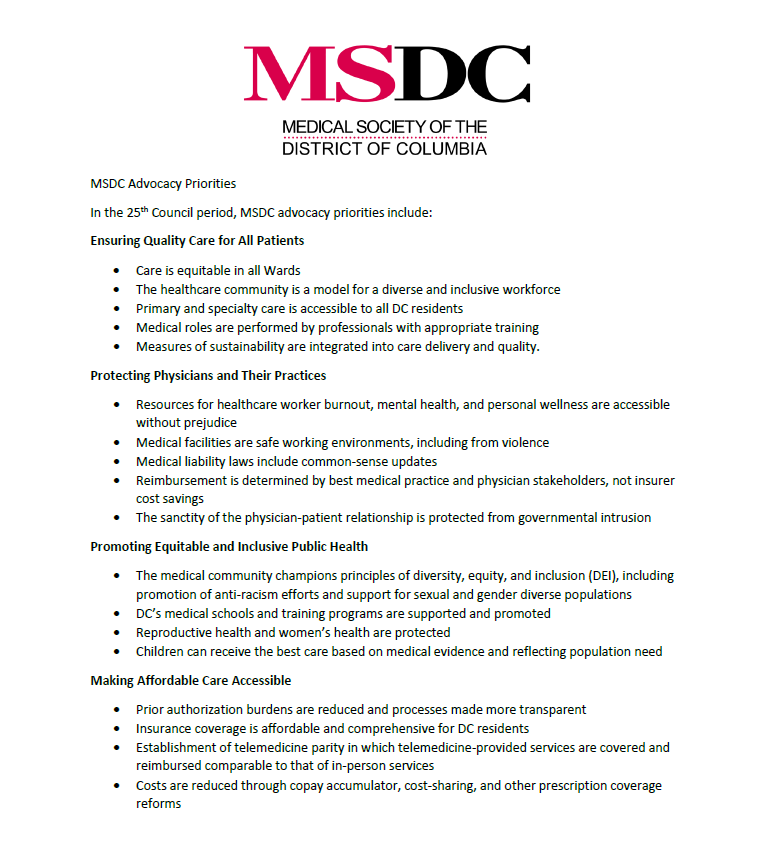Health Equity
Medicaid Enrollment Touches 39% of the Residents of The District of Columbia; DC’s 70/30 FMAP is Vital for the Maintenance of Health & Human Services
A reduction in the District’s FMAP would not lead to long-term government savings and would have a ripple effect throughout the entire health system in the DMV, crippling access to care for not only Medicaid beneficiaries but also all those who live, work, and visit the District of Columbia, including members of Congress and their staffs.
.png?sfvrsn=9ac2d21b_0)
Why does DC receive an Enhanced FMAP Rate?
The DC FMAP rate of 70% established by the Revitalization Act resulted from bipartisan analysis, discussion, and negotiation by Congressional leadership aiming to balance fairness with the District’s restricted ability to generate revenue. Congress recognized that the District of Columbia faces unique financial challenges due to its non-state status and the significant amount of federally-owned land within its boundaries. The District is unable to tax non-residents’ earnings, so these workers pay no taxes to support the infrastructure and services, such as roads, public safety and emergency services that they benefit from in the District. The District is also unable to tax up to 40% of the real property within its borders due to statutory restrictions.
Why are we concerned about DC's FMAP now?
Members of Congress have proposed reducing the DC FMAP to the statutory minimum for all other states, which is currently 50% (but could be reduced even more). Such a change would impact every physician and every practice, regardless of type, location, and payers contracted. Even practices who take no insurance will not be able to send patients for specialist care, hospital admissions, or other types of care.
What can MSDC members do?
- If you know a member of Congress or staffer, reach out to them and share how DC cuts will hurt your patients.
- Share your relationships and outreach with hay@msdc.org so we can help coordinate advocacy efforts.
- Email hay@msdc.org if you would like to be paired with a physician member of Congress office and trained by MSDC staff on how to reach out.
Resources
- DC FMAP cut fact sheet
- California Medical Association fact sheet on Medicaid cuts
- MSDC and healthcare association letter to Congress arguing against DC FMAP changes.
- MSDC original story on Medicaid changes.
News, Statements, and Testimony on Health Equity Issues
MSDC Announces 25th Council Period Advocacy Agenda
With the current Council of DC legislative period approaching its end, MSDC is pleased to announce its advocacy agenda for the next two years.
At its December 5 Board of Directors meeting, the Board unanimously approved its advocacy priorities for 2023-2024. The agenda is modeled after the one the Board approved two years ago and establishes the Society's advocacy priorities during the next Council period. The agenda was updated and reviewed by MSDC's Advocacy Committee prior to the Board meeting.
As seen below, the agenda focuses on four areas that help make the District "the best place to practice medicine":
- Ensuring Quality Care for All Patients
- Protecting Physicians and Their Practices
- Promoting Equitable and Inclusive Public Health
- Making Affordable Care Accessible
Most of the priorities remain similar from the 2021-2022 document, as this one seeks to build off of a series of major advocacy wins this Council period. A summary of this session's advocacy successes will be published in the near future.
Making the list this year are a few new or
adjusted priorities. Nationwide challenges to the expertise of
physicians led to clearer calls for advocacy in areas like children's
healthcare, reproductive health, and health facility safety. The
document also includes for the first time advocacy for "measures of
sustainability" to reflect concerns about environment change and
medicine. Telemedicine is also explicitly spelled out as the pending end
of the federal public health emergency and insurer practice changes
endanger the effectiveness of this important medical tool.
MSDC
also looks to build on its unprecedented grassroots and testifying
record this Council period. MSDC members and physicians who want to become more involved in local advocacy can contact Robert Hay at hay [at] msdc.org.

